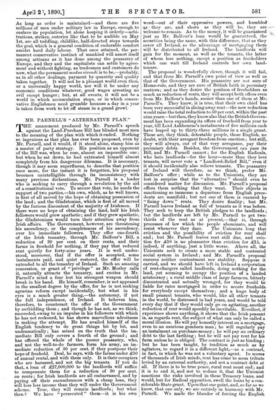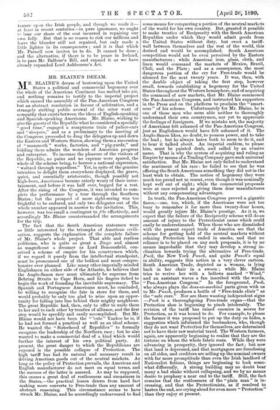MR. PARNELL'S " ALTERNAILV PLAN." T HE amazement produced by Mr.
Parnell's speech against the Land-Purchase Bill has blinded most men to the meaning of the plan with which it ended. Nothing so ingenious as that plan has ever been proposed, even by Mr. Parnell, and it would, if it stood alone, stamp him as a master of party strategy. His position as an opponent of the Bill was, when he rose, almost an impossible one ; but when he sat down, he had extricated himself almost completely from his dangerous dilemma. It i necessary, though it may seem superfluous, to describe that position once more, for the instant it is forgotten, his proposal becomes unintelligible through its inconsistency with many previous declarations. Mr. Parnell is a leader who is seeking to carry through a revolution by the aid of a constitutional vote. To secure that vote, he needs the support of two parties,—his own, which, as he well knows, is first of all moved by the hope of obtaining possession of the land; and the Gladstonian, which is first of all moved by the furious discontent of the majority of Irishmen. If there were no hope of obtaining the land, half his Irish followers would grow apathetic; and if they grew apathetic, the Gladstonians would turn their attention away from Irish affairs. The Government, however, are threatening his ascendency, or the completeness of his ascendency, over his immediate followers. They offer one-fourth of the Irish tenantry, through Mr. Balfour's Bill, a reduction of 30 per cent, on their rents, and their farms in freehold for nothing, if they pay that reduced rent quietly for forty-nine years. It is well under- stood, moreover, that if the offer is accepted, some instalments paid, and quiet restored, the offer will be extended to all the tenantry of Ireland. Such an amazing concession, or grant of " privilege " as Mr. Morley calls it, naturally attracts the tenantry, and excites in Mr. Parnell's mind a fear lest his strongest weapon should break in his hand. He himself, remember, is not appeased in the smallest degree by the offer, for he is not seeking agrarian reform except incidentally, but what in his eyes is a much greater thing,—the autonomy, if not the full independence, of Ireland. It behoves him, therefore, to counteract the offer of the Government by outbidding them ; and though he has not, as we think, succeeded, owing to an impulse in his followers with which he has not reckoned, he has shown marvellous adroitness in making the• attempt. He has availed himself of the English tendency to do great things bit by bit, and undramatically ; has seized on the truth that the im- mediate Bill only covers a fourth of the ground ; and has offered the whole of the poorer peasantry, who, and not the well-to-do farmers, form his army, an im- mediate reduction of 30 per cent. if they postpone their hope of freehold. Deal, he says, with the farms under £50 of annual rental, and with them only. It is their occupiers who are harassed, and not the big tenants. If you do that, a loan of £27,000,000 to the landlords will suffice to compensate them for a reduction of 30 per cent. on rents ; for Irish landlords are all embarrassed, and by paying off their encumbrances with a cheap loan, they will lose less income than they will under the Government scheme. True, they will remain landlords ; but what then ? We have " persecuted " them—it is his own word—out of their oppressive powers, and humbled' ris, they are, and shorn as they will be, they are Welcome to remain. As to the money, it will be guaranteed just as Mr. Balfour's loan would be guaranteed, the '- securities being the same, with this difference, that as they cover all Ireland, so the advantage of mortgaging them will be distributed to all Ireland. The landlords will gain for the moment, as well as the tenants, the latter of whom lose nothing, except a position as freeholders which can wait till Ireland controls her own land- tenure.
The proposal is wonderfully clever, though it will fail,, and that from Mr. Parnell's own point of view as well as that of the Government. His peasantry are not sure of Home-rule, and they are sure of British faith in pecuniary matters ; and as they desire the position of freeholders as- much as reduction of rents, they will accept both offers even from Mr. Balfour's hands, sooner than one of them at Mr. Parnell's. They know, it is true, that their own chief has been very successful in slicing away rent—the new reduction would raise the total reduction to 50 per cent, within the past nine years—but then, they know also that the British Govern- ment has been expanding its offers of freehold from year to year, till Lord Ashbourne's instalments of five millions each have leaped up to thirty-three millions in a single grant. These are, they think, detestable people, these English, no doubt, with their arrogant freedom from emotion ; but still, they will always, out of that very arrogance, pay their pecuniary debts. Besides, the Government can pass its Bill, and Mr. Parnell cannot ; for the English Radicals, who hate landlords—for the hour—more than they love tenants, will never vote a "Landlord-Relief Bill," even if it should incidentally also relieve tenants. The peasantry of Ireland will therefore, as we think, prefer Mr. Balfour's offer ; while as to the Unionists, they are lost in surprise that the " alternative " should even be considered matter for discussion. Mr. Parnell's proposal offers them nothing that they want. Their objects in sanctioning so immense a departure from English prece- dents are manifold; but not one of them is ensured by "fining down" rents. They desire finality ; but Mr. Parnell leaves Ireland as full of tenants as it was before. They seek to keep the British pledges to the landlords;. but the landlords are left by Mr. Parnell to get two- thirds of the rent as at present, —that is, through processes of law which the people abominate, and will resist whenever they dare. The Unionists long that eviction and the possibility of eviction for rent shall end ; but Mr. Parnell leaves rent still due, and evic- tion for .e10 is no pleasanter than eviction for £15, is indeed, if anything, just a little worse. Above all, the Unionists seek to create a more stable and contented social system in Ireland ; and Mr. Parnell's proposal ensures neither contentment nor stability. Suppose it carried, and we should have left in Ireland a corporation of rent-chargers called landlords, doing nothing for the land, yet seeming to occupy the position of a landed aristocracy ; a rural middle class of large farmers, bitterly discontented and actually wronged, for they would be liable for rates mortgaged in order to secure freeholds for everybody except themselves ; and a huge body of small peasant tenants, who would, like all other tenants in the world, be distressed in bad years, and would be told every day that if they would only go on agitating, another reduction of rent would speedily be inevitable. Recollect, if experience shows anything, it shows that the Irish peasant is, as regards rent, the subject of what can only be called a moral illusion. He will pay honestly interest on a mortgage, even to an usurious gombeen man ; he will regularly pay an instalment on purchase-money ; he will pay an ordinary debt to the last farthing ; but he will not pay rent for his farm unless he is obliged. The contract is just as binding ; but he has been taught, by tradition as much as by agitators, to regard it in a different light,—as a contract, in fact, in which he was not a voluntary agent. In scores of thousands of Irish minds, rent has come to seem tribute levied by an external authority, and not a contract debt at all. If there is to be true peace, rural rent must end ; and it is to end it, and not to reduce it, that the Unionist sanctions the risks involved in these Treasury loans, and would, but for Radical opposition, swell the loans by a con- siderable State grant. Upon that one point, and, so far as we know, that one only, we are entirely in harmony with Mr. Parnell. We made the blunder of forcing the English_ tenure upon the Irish people, and though we made it— at least in recent centuries—in pure ignorance, we ought to bear our share of the cost incurred in repairing our own folly. But that is no reason to risk our millions and leave the blunder still not repaired, but only made a little lighter in its consequences ; and it is that which Mr. Parnell now invites us to do. It cannot be done ; and the alternative, if there is to be peace in Ireland, is to pass Mr. Balfour's Bill, and expand it as we have already expanded Lord Ashbourne's Act.



































 Previous page
Previous page